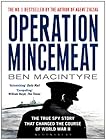 Lost in Shangri-La: A True Story of Survival, Adventure, and the Most Incredible Rescue Mission of World War II
Lost in Shangri-La: A True Story of Survival, Adventure, and the Most Incredible Rescue Mission of World War II by
Mitchell ZuckoffMy rating:
3 of 5 starsMore unbelievable stories from WWII.
Upon reading the subtitle, I thought "Most Incredible Rescue Mission"? Those are fighting words, especially if you have read
Ghost Soldiers: The Epic Account of World War II's Greatest Rescue Mission. But that book's author,
Hampton Sides was willing to write a blurb for the back cover. The difference between these two missions does focus on the "incredible" aspect. The Alamo Scouts' rescue mission in the Phillipines was amazingly well executed and very lucky. The accident and airlift from Shagri-La in New Guniea was a matter of "really, who writes this stuff?"
So well before
Gilligan's Island every aired, the Army Air Corps ran a "three-hour tour" sight-seeing flight over an isolated stone-age valley deep in the mountains. This wasn't the first fly-by, but this flight was mainly a morale-builder for WACs based in Hollandia. Mistake number one? Picking a plane called the 'Gremlin Special' - really!
After the inevitable crash, we have a set-up from a bad
Edgar Rice Burroughs pulp novel. Two men and one woman trapped in a land time forgot - with cannibals! The survivors even knew the tropes and joked about having to swing on vines to cross streams and debating which of the men would inevitably have to marry Maggie the WAC once they were rescued.
Oh, no, that's not good enough. We have to meet the young-go-getting officer of the rescue party, an Anglo officer of a unit of Fillino-American guerilla-trained paratroopers. He aso has MAJOR daddy-issues as his father is stayed in the Phillipines to run a partisan movement and has asked the Army brass to bench his son's unit since his son can't possibly measure up. Serious guy-shit!
And the rescue? Gathering a rag-tag band of experts and equipment from across the Pacific to try and land a glider and then snatch it back into the air. All this while reporters circle the valley conducting interviews by radio and a former actor/jewel thief/sailor parachutes in (drunk) to catch the whole thing on film for the propaganda value.
OK, so this is all very American pulpy. But this is not the real strength of the book.
Mitchell Zuckoff has travelled to Shangri-La to interview the locals who remember the crash and rescue effort. Seeing the whole first-contact aspects through the locals eyes really does help show how strong the pulp-stories were in the minds of the Americans and colored everything they saw around them.
View all my reviewsLabels: New Guinea, Pulp-novels, Review, WAC










